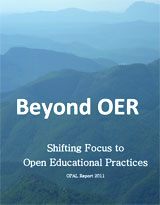 The Open Educational Quality Initiative (OPAL) released its Report 2011, entitled Beyond OER: Shifting Focus to Open Educational Practices. Key factors:
The Open Educational Quality Initiative (OPAL) released its Report 2011, entitled Beyond OER: Shifting Focus to Open Educational Practices. Key factors:
- Policy support for OER
- Role of networks and partnerships for the diffusion of OER in institutions
- Demand for specific quality assurance processes for OER
The report notes that building trust in OER would help increase the actual usage of OER in combination with open learning architectures in order to transform learning.
OER is reported to have an effect on institutional innovation culture, in higher education as well as in adult education institutions. It may thus be concluded that, regardless of educational professionals considering OER to be important for themselves or for others (e.g., students), the lesser the fear, insecurity or discomfort vis-a-vis OER, the higher the frequency of OER use. As regards the existence of open resources’ programmes or initiatives in the institution, individuals from institutions where such programmes/initiatives already exist did show a higher frequency of OER use.
The report is divided into sections to elicit macro and micro factors to explain the slow uptake of OER within organisations:
- A policy environment for supporting the usage of OER is important
- Institutional support strategies are fostering open educational practices
- Networks of Innovation play an important role for shaping OER developments and open educational practices
- Specific quality assurance processes for OER are viewed necessary
- Open educational practices are supported through cultures of innovation and in turn provide innovation in organisations
To read full report click here [pdf].